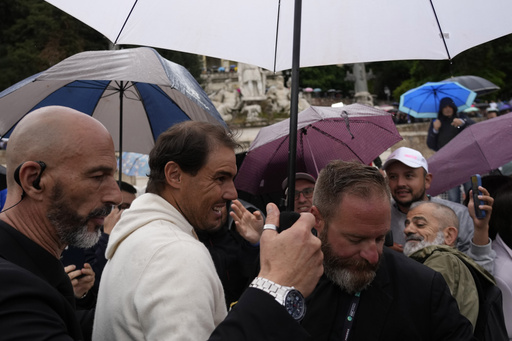ROME (AP) — Rafael Nadal’s clay-court form is slowly rounding into shape.
Not that nearly invincible shape that the tennis world grew accustomed to over the past two decades. But a shape that the 22-time Grand Slam champion is starting to feel good about as he prepares to play what will likely be his final French Open.
“It’s a good moment, even if the results are not what (they) used to be,” Nadal said at the Italian Open on Wednesday. “But I am increasing my feeling, my level. … I want to keep going.”
The 37-year-old Nadal, who has indicated that this will be his final year on tour, has played only nine matches this year after missing nearly all of 2023 due to a hip injury that required surgery.
But he’s coming off his most encouraging performance of the year, having put together three straight wins at the Madrid Open last week before losing in straight sets to 31st-ranked Jiri Lehecka in the fourth round.
Before Madrid, he won only one match in Barcelona.
“The line is going up, without a doubt,” Nadal said, making a gesture with his hand to demonstrate his improvement. “Happy to be today where I am because one month ago for me was almost impossible to think that I will be able to play in Barcelona, then in Madrid, and now being here in Rome. … Things are happening.
“All the matches are tough for me today and difficult and more unpredictable than what the matches used to be for me, especially on clay,” Nadal added. “I accept that role. I accept that challenge. I am excited about the way that I can be able to play if I keep working the proper way and my body allows me.”
Nadal is hoping to be competitive one last time at Roland Garros, where he is the record 14-time champion. Rome is his last big warmup tournament before the clay-court Grand Slam starts on May 26.
“First of all, I want to play Rome. That’s the tournament that I am (at) today. I don’t think after that,” said Nadal, who had his 1-year-old son courtside for his practice sessions at the Foro Italico this week.
Nadal’s opening match in Rome is scheduled for Thursday against Belgian qualifier Zizou Bergs, who is ranked No. 108.
Top-ranked Novak Djokovic, who is also back in Rome after a month out, is on the opposite half of the draw from Nadal. But second-ranked Jannik Sinner and third-ranked Carlos Alcaraz both withdrew because of injuries.
Djokovic hasn’t played for nearly a month — since he lost to Casper Ruud in the Monte Carlo Masters semifinals. He’s also without a title this year — the first time he’s reached May without a trophy since 2018 when he was returning from a right elbow injury.
But the 36-year-old Serb was optimistic about his chances of defending his French Open title.
“I think I’m on a good route to peak at Roland Garros in Paris,” Djokovic said. “Hopefully here in Rome I can play better than I did in Monte Carlo.”
Djokovic added that his withdrawal from the Madrid Open wasn’t because of physical issues.
“It was not part of the schedule,” he said. “The plan was to come here. That’s basically it.”
Nadal has won the Italian Open a record 10 times and he rated his first two titles at the Foro Italico as his most memorable: five-set victories over Guillermo Coria and Roger Federer in 2005 and 2006, respectively.
Starting in 2007, the Rome final was switched to a best-of-three sets format.
“Most of (the) important moments of tennis have been playing in matches best-of-five because at the end of the day that makes the matches more emotional, more dramatic, the people get more involved,” Nadal said. “Those amazing battles that are part of the history of our sport.
“It’s true that I won 10 times here. But if you tell me my memories, for me I’m much more fresh the memories of the first two victories in five sets against Coria and against Roger than the other (titles). Even if I had amazing, good matches against Novak, against great players,” Nadal added. “But that’s what I think the people remember more.”
___
AP tennis: https://apnews.com/hub/tennis
This website uses cookies so that we can provide you with the best user experience possible. Cookie information is stored in your browser and performs functions such as recognising you when you return to our website and helping our team to understand which sections of the website you find most interesting and useful.
